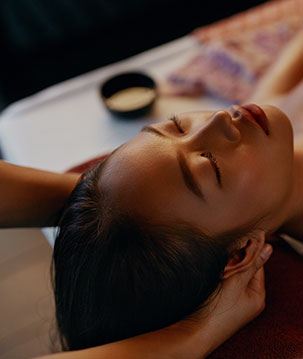Thai Massage
Combatting Stress and Anxiety with Thai Massage
30 Apr, 2024

A Stress-Busting Solution
In our hectic world, stress and anxiety are prevalent. Thai massage offers a holistic approach to combat them. Originating in Thailand, this technique combines acupressure, yoga, and Ayurvedic principles. It focuses on rhythmic compressions, stretches, and joint manipulations.
Thai massage induces deep relaxation, releasing tension stored in the body and promoting peace of mind. By restoring energy flow along the body’s pathways, it alleviates physical discomfort and emotional distress. Moreover, it boosts flexibility, improves circulation, and stimulates endorphin release, enhancing overall well-being.
With its mindfulness elements, Thai massage encourages present-moment awareness, calming the mind and fostering mental clarity. Whether as a standalone treatment or part of a wellness routine, Thai massage offers a sanctuary of calm in today’s chaotic world, restoring balance to body, mind, and spirit.
To combat stress and anxiety and promote relaxation and peace of mind, consider incorporating the following practices into your daily routine:
- Mindfulness Meditation: Set aside time each day for mindfulness meditation, focusing on your breath and bringing your attention to the present moment. This practice can help calm the mind, reduce stress, and enhance overall well-being.
- Deep Breathing Exercises: Practice deep breathing exercises regularly to activate the body’s relaxation response. Take slow, deep breaths in through your nose, allowing your abdomen to expand, and exhale slowly through your mouth.
- Progressive Muscle Relaxation: Learn progressive muscle relaxation techniques, where you systematically tense and then release muscle groups throughout your body. This helps alleviate physical tension and promote relaxation.
- Yoga or Tai Chi: Engage in yoga or tai chi, both of which combine gentle movements with mindfulness and breath awareness. These practices can help reduce stress, increase flexibility, and promote a sense of inner calm.
- Physical Activity: Incorporate regular exercise into your routine, such as walking, jogging, cycling, or dancing. Physical activity releases endorphins, which are natural stress relievers, and helps improve mood and overall well-being.
- Healthy Lifestyle Habits: Maintain a balanced diet, prioritize regular sleep, and avoid excessive caffeine, alcohol, and nicotine. A healthy lifestyle supports emotional resilience and can help buffer the effects of stress.
- Limit Exposure to Stressors: Identify sources of stress in your life and take proactive steps to limit exposure to them where possible. This may involve setting boundaries, saying no to additional commitments, or seeking support from others.
Share :




